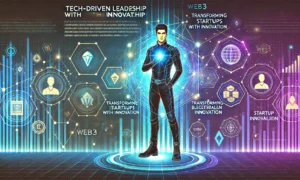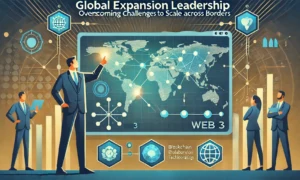The Web3 revolution isn’t bound by borders. It’s a global phenomenon that unites developers, investors, and communities from all corners of the world. For founders, this offers incredible opportunities—but also significant challenges. Leading a decentralized, globally distributed team requires a unique approach to collaboration, communication, and cultural integration.
In this article, we’ll explore how Web3 leaders are bridging gaps across time zones and cultures to build innovative startups and inspire global success.
Why Global Collaboration is Crucial in Web3
Unlike traditional industries, Web3 startups often emerge as decentralized projects. Teams are spread across continents, collaborating through online platforms. This model brings unparalleled diversity, creativity, and problem-solving potential—but only if leaders know how to harness it.
Here’s why global collaboration is at the heart of Web3 success:
- Access to Diverse Talent: From blockchain developers in Estonia to marketing experts in Singapore, the world is a talent pool.
- 24/7 Operations: A globally distributed team means work continues around the clock.
- Community-Centric Growth: Web3 projects thrive when they connect with users worldwide, requiring leaders to think beyond borders.
The Polygon Success Story: Uniting a Global Workforce
Polygon, a leader in scaling Ethereum-compatible blockchains, is a perfect example of effective global collaboration. When Polygon expanded, they faced challenges managing a team scattered across multiple countries. Here’s how they overcame those obstacles:
- Clear Communication Channels: Polygon adopted tools like Slack and Discord to ensure seamless communication.
- Incentivizing Innovation: By offering equity and token-based rewards, they motivated team members to contribute their best.
- Cultural Awareness: Leaders hosted virtual events to celebrate cultural diversity, fostering a sense of unity.
Today, Polygon’s global team operates like a well-oiled machine, delivering groundbreaking solutions for blockchain scalability.
Building Trust Across Borders
Trust is the foundation of any successful team, but it’s especially critical when teams are distributed globally. Web3 leaders must go the extra mile to establish trust among remote members.
Case Study: Uniswap’s Global Community
Uniswap, the decentralized exchange, created a community-driven governance model that empowers users worldwide. By giving token holders a say in platform decisions, Uniswap built a global community that feels ownership and trust in the project’s vision.
Top Strategies for Leading Global Teams in Web3
1. Leverage Technology for Seamless Collaboration
Web3 leaders rely on tools like Zoom, Slack, and Asana to connect and coordinate across time zones. Decentralized tools, like DAO governance platforms, also streamline decision-making.
2. Embrace Cultural Diversity
Understanding cultural nuances fosters better communication and reduces misunderstandings. Leaders should create inclusive environments where team members feel valued, regardless of their location.
3. Prioritize Transparency
In a decentralized world, transparency builds trust. Regular updates, open meetings, and accessible documentation ensure that everyone stays aligned.
4. Incentivize Team Members
Token-based incentives, equity sharing, or profit-sharing models motivate remote teams to stay committed.
5. Enable Autonomous Workflows
Empowering teams to make decisions without micromanagement increases efficiency and ensures work progresses smoothly across time zones.
How Decentralized Collaboration Drives Innovation
Global collaboration isn’t just about working together—it’s about unlocking innovation. Here’s how:
- Diverse Perspectives: Different cultural backgrounds inspire creative problem-solving.
- Round-the-Clock Development: Teams in different time zones can ensure non-stop progress.
- Global Community Insights: Teams working worldwide can connect better with decentralized communities.
FAQs About Global Collaboration in Web3
Why is global collaboration important in Web3?
Web3 thrives on decentralization, which means leveraging talent, insights, and creativity from around the globe.
What tools help global Web3 teams collaborate effectively?
Platforms like Discord, Slack, Zoom, and DAO governance tools ensure seamless communication and decision-making.
How can Web3 leaders foster cultural inclusivity?
By hosting team-building activities, celebrating diverse holidays, and encouraging open communication, leaders can foster inclusivity.
What incentives work best for global teams in Web3?
Token rewards, equity sharing, and performance-based bonuses align with the decentralized nature of Web3 startups.
Conclusion: Uniting the World Through Web3 Leadership
Leading a global team in Web3 is both a challenge and an opportunity. The most successful leaders embrace diversity, foster trust, and use technology to bridge gaps. By focusing on transparency and collaboration, they unlock the true potential of their teams and communities.
As Web3 continues to grow, the ability to lead across borders will become the defining trait of successful founders. Are you ready to step up and lead in this decentralized world?


